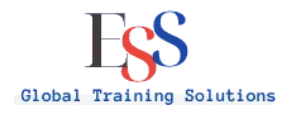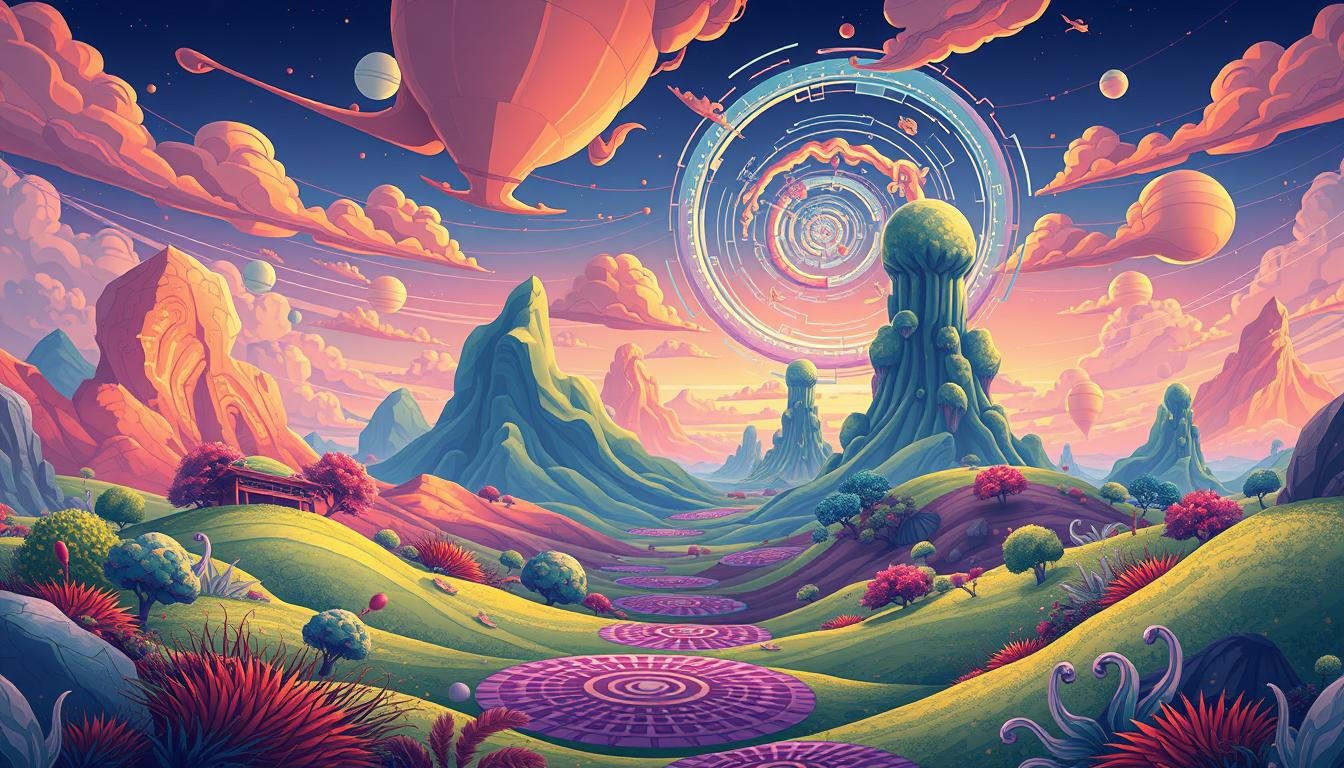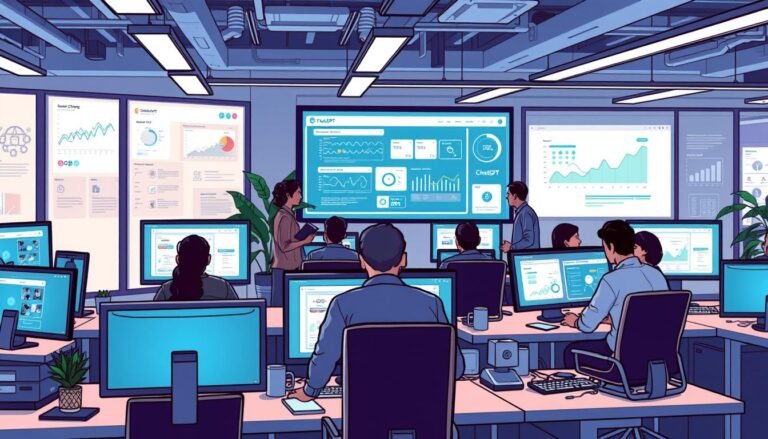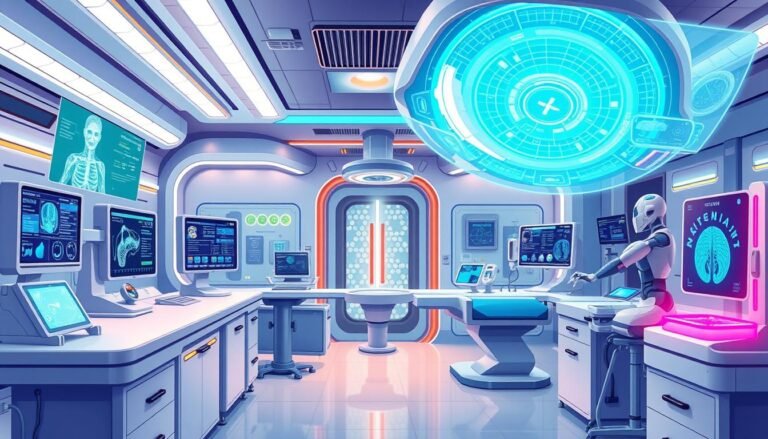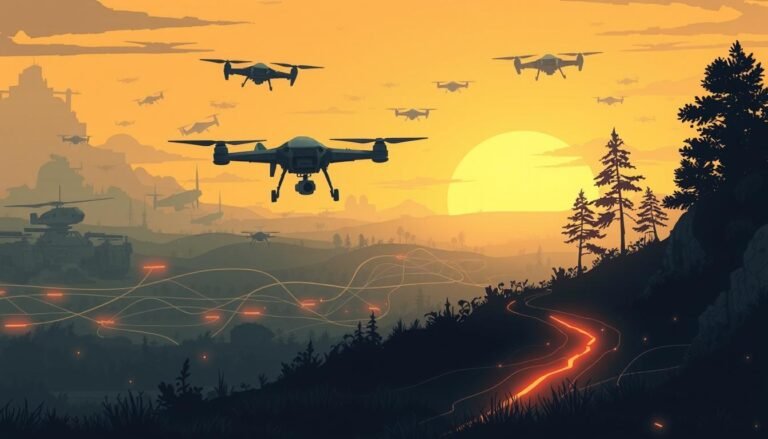AI-Generated Art and Creativity: The Future of Design
Can artificial intelligence really create art as good as humans? This debate is heating up as AI art changes the design world. From simple crochet patterns to stunning masterpieces, AI is mixing old traditions with new ideas.
Machine learning art is opening new paths for artists and designers. AI looks through huge databases of designs, making new patterns based on what users want. This tech makes things faster and lets more people join in the creative fun.
Tools like Toolify.ai show how AI can help in design. It’s easy to use, and users can get special patterns for their projects. The AI gets better with each use, blending human talent with AI smarts. This mix is changing design in many areas.
Key Takeaways
- AI tools analyze existing designs to create unique patterns
- Machine learning art enhances creativity and accessibility
- AI-generated art bridges tradition and innovation
- Platforms like Toolify.ai offer customized design solutions
- The future of design involves collaboration between human creativity and AI
The Rise of AI in Creative Industries
AI is changing the world of art and design. It has brought new ways for artists and designers to work. AI can make images look real and write text that sounds like it was written by a person.
Evolution of AI Technologies in Art and Design
AI has grown fast, leading to tools like DALL-E and ChatGPT. These tools can make amazing pictures and text from simple ideas. They show how AI can help in making content.
AI also helps in 3D printing and robotics. This has made it possible to create big art pieces and new designs.
Impact on Traditional Creative Processes
AI has changed how artists work, making things faster and easier. It lets artists try new things. But, it also makes people worry about who owns the art and if it’s real.
The art world is thinking about these big questions. They are looking at things like who owns the art and keeping data safe.
Key Players and Platforms in AI-Generated Art
Some AI art platforms are leading the way. OpenAI’s DALL-E and Midjourney are making text into images. Toolify.ai helps with patterns and making things your own.
These platforms give artists great tools. They also help artists learn and share ideas.
| AI Platform | Specialization | Impact on Creative Process |
|---|---|---|
| DALL-E | Text-to-image generation | Enables quick visualization of concepts |
| Midjourney | Artistic image creation | Expands artistic possibilities |
| Toolify.ai | Pattern generation | Streamlines design workflow |
As AI gets better, the art world needs to find a way to keep it fresh. They must balance new ideas with the special touch that makes art unique.
Understanding AI-Generated Art and Creativity
AI art creation has changed the game in the creative world. Now, machine learning can make unique designs by looking at lots of art. This opens up new chances for artists and designers.
Creative AI tools can make detailed patterns. They include things like material, stitch type, and how-to steps. This lets artists dive into new creative areas while keeping their work precise.
AI art is also great at making things personal. It can adjust to what the user likes, helping more people get into art.
“AI art creation is not about replacing human creativity, but enhancing it. It’s a tool that expands our creative horizons,” says renowned digital artist Emma Clarke.
Let’s look at some cool features of AI in art:
- Pattern generation
- Style transfer
- Color palette suggestions
- 3D modeling assistance
The art world is seeing a big change thanks to AI. More AI art shows and sales are happening. This shows a promising future for tech and art together.
| AI Art Feature | Benefit to Artists | Impact on Art Industry |
|---|---|---|
| Pattern Generation | Endless inspiration | Increased productivity |
| Style Transfer | Exploration of new styles | Blending of art movements |
| Color Palette Suggestions | Time-saving color choices | Trend prediction |
| 3D Modeling Assistance | Faster prototyping | Advanced digital art forms |
Machine Learning Art: Techniques and Technologies
AI-generated art is changing the creative world. Artists use powerful tools to explore new ideas. This section looks at the latest techniques in digital art.
Generative Adversarial Networks (GANs) in Art Creation
GANs lead in AI-generated art. They have a generator and a discriminator. The generator makes images, and the discriminator checks them.
Deep Learning Algorithms for Style Transfer
Deep learning art lets artists mix styles. This is called style transfer. It lets artists blend styles or create new ones.
AI-Powered Image Manipulation and Enhancement
AI tools change how artists edit their work. They can adjust colors, remove things, or add new parts. This makes the creative process faster and more fun.
| Technique | Application | Benefit |
|---|---|---|
| GANs | Creating original artworks | Unique, AI-generated compositions |
| Style Transfer | Applying artistic styles | Blending of different artistic influences |
| AI Image Manipulation | Editing and enhancing images | Rapid iteration and experimentation |
As these tools get better, artists have more ways to be creative. Mixing human talent with machine learning is creating new digital art possibilities.
AI Art Tools: Empowering Artists and Designers
AI art tools are changing how we create digital art and design. These platforms help artists and designers make, change, and improve their work. They are for all levels, from newbies to experts, making art more creative and diverse.
These tools are easy to use, so anyone can start creating. Artists can make patterns, change designs, and try out new styles. They work fast, making it easier to try out new ideas.
AI-assisted design tools have cool features like:
- Color palette suggestions
- Style recommendations
- Image enhancement
- Pattern generation
These features help artists explore new ideas and improve their work easily.
“AI art tools are not replacing human creativity; they’re amplifying it, allowing artists to focus on the conceptual aspects of their work while AI handles the technical details.”
AI is making a big difference in the creative world. Here are some interesting facts:
| Aspect | Impact |
|---|---|
| AI in Computer Vision | Superior performance in image enhancement, classification, and segmentation |
| Microscopic Imagery | Expansion of deep learning techniques due to large-scale whole slide imaging datasets |
| Multiphoton Microscopy (MPM) | High-resolution, label-free imaging across various human pathological tissues |
| AI Integration with MPM | Distinctive auxiliary diagnosis and prognosis prediction in pathological analysis |
As AI art tools get better, they will open up new creative possibilities. They will help artists and designers reach new heights in their work.
Creative AI Models: Pushing the Boundaries of Imagination
AI is changing the creative world. It gives artists and designers new tools to explore their imagination. Technologies like text-to-image AI, AI 3D modeling, and AI music composition are changing how we create and interact with art.
Text-to-Image Generation Models
Text-to-image AI has made big progress. Midjourney, a leading platform, is about to release Version 6.2. This version will let users make up to eight images per prompt.
This will make the creative process faster and more efficient for artists and designers. It will give them more options to work with.
AI-Assisted 3D Modeling and Animation
AI 3D modeling is changing the film and gaming worlds. Midjourney plans to focus on 3D model development. This could change how we create characters and worlds.
This technology could make entertainment and virtual reality more immersive and visually stunning.
Music Composition and Sound Design with AI
AI music composition is opening new doors for musicians and producers. While there were no updates on this, AI’s potential in creating unique sounds and compositions is huge.
| AI Creative Tool | Current Feature | Upcoming Feature |
|---|---|---|
| Midjourney | Single image generation | Batch image generation (up to 8) |
| Video Model | Basic video outputs | Enhanced face consistency |
| Storytelling Mode | Not available | New UI for character and world creation |
These advancements in creative AI models are changing how we create art. They offer endless possibilities for creators in different fields. As AI keeps evolving, we’ll see even more innovative tools. These will make the line between human and machine creativity even thinner.
The Ethics of AI-Generated Art
The rise of AI-generated art has sparked heated debates. People are talking about AI art ethics, copyright issues, and artistic authenticity. As AI tools get better, the art world is trying to figure out who owns what and what is creative.
AI’s effect on creative industries is big. A survey showed 30-40 people use AI for things like campaign development and character creation in Dungeons & Dragons. This makes some worry that AI might take away the personal touch in creative work.
Copyright issues are a big challenge. OpenAI has teamed up with big names like Condé Nast and Time for content licensing. This shows how complex the legal side of things is. Artists are concerned that AI might copy their styles without asking, which could hurt their careers.
“We need to be responsible, pay creators for their work, and ensure transparency in distinguishing AI-generated content,” said Chris Cocks, addressing concerns about AI in creative fields.
Artistic authenticity is a big question. AI models like OpenAI’s o1 can do amazing things, including create art. But, people still wonder if machines can really create “art” or if they’re just copying humans.
| Aspect | Human Artists | AI-Generated Art |
|---|---|---|
| Emotional Intelligence | High | Limited |
| Technical Precision | Variable | Consistent |
| Creative Intuition | Strong | Developing |
| Ethical Considerations | Self-guided | Programmed |
As AI keeps getting better, the art world must face these ethical issues. Finding a balance between new tech and keeping human creativity alive will define the future of AI-generated art.
AI Art Market: Trends and Opportunities
The AI art market is booming. New places for buying AI art are appearing. People are getting excited about AI art, seeing it as a new investment.
But, figuring out the value of AI art is hard.
Emerging Platforms for AI Art Sales
Online spaces for buying and selling AI art are growing. These platforms help artists show their AI art. Buyers can find unique pieces from everywhere.
Collector Interest and Investment Potential
Art lovers are interested in AI art. They see it as a new collecting frontier. Some think AI art could be a smart investment.
As the field grows, so does the chance for value to increase. But, it’s still new, so there’s risk too.
Challenges in Valuing AI-Generated Art
Putting a price on AI art is tricky. Old ways of valuing art don’t always work here. Questions arise about who made the art – the human or the machine?
This makes it hard to set fair prices. There’s also the issue of proving a piece is real and unique.
| Aspect | Traditional Art | AI Art |
|---|---|---|
| Creator | Human artist | AI + human input |
| Uniqueness | One-of-a-kind | Can be reproduced |
| Valuation | Based on artist reputation | Unclear standards |
| Authentication | Established methods | New challenges |
The AI art market is full of new ideas and chances. It’s changing how we think about art and its worth. As tech gets better, we’ll likely see more growth in AI art sales and investment.
The Future of Design: AI Art Styles and Techniques
AI design techniques are changing the art world. New art styles mix old ways with new tech. This mix is making art more personal and efficient in many fields.
AI is helping artists create together. Humans and AI work as a team to make unique art. This teamwork is bringing new ideas to the art scene.
The future of AI art is exciting. New trends are emerging:
- Prompt minimalism: Making it easier to work with AI for art
- Adaptive prompting: Changing strategies for better results
- Hybrid approaches: Using simple and detailed prompts together
These methods are making AI tools easier for more artists to use. As AI gets better, so do the ways we work with it. Finding the right balance in prompts is key for great human-AI teamwork.
| AI Model | Prompting Strategy | Key Benefit |
|---|---|---|
| OpenAI’s o1 | Minimalist prompts | Unparalleled accuracy and speed |
| GPT-3.5 | Detailed prompts | Enhanced performance for older models |
| Hybrid Models | Adaptive prompting | Flexibility and customization |
Looking ahead, AI art will keep blending human touch with machine power. This mix will lead to new art styles and endless creative possibilities.
Conclusion
The impact of AI on art is clear. AI-generated art is changing how we create. Tools like Toolify.ai are making big changes in crochet, offering new patterns and welcoming everyone.
AI is also making content creation faster and more creative. For example, Chat GPT has made a big difference. It shows how AI can help us do more with less effort.
The future of creativity is about working together with AI. OpenAI O1 is a great example. It shows how AI can make us better at art and solving problems.
This partnership between humans and AI is creating new ways to express ourselves. It’s happening in fields like biology and math. This is opening up new possibilities for us all.
But we need to think about the ethics of AI-generated content. AI has many benefits, like making things faster and more creative. Yet, human creativity is still key.
The future of design will be a mix of AI and human creativity. This will lead to new and exciting ways of expressing ourselves.
Source Links
- How to Design a Crochet Pattern via AI Tools
- ‘They have done fantastically well’: how London’s blockbuster Vincent Van Gogh exhibition is reframing myths
- Muscatine Art Center plans for the future
- Robotic Arm 3D Printing: Technological Advancements and Applications
- 🚀 Generative AI for Content Creation: Tools & Ethics [2024–10–05]
- Generative AI in Music Isn’t the Problem.
- An alt-girl’s perspective: Airing my ‘dirty’ playlist
- The Stepping Off Point
- Ways of Seeing | Julien Posture
- ORPP—An Ontology for Skill-Based Robotic Process Planning in Agile Manufacturing
- The Right Reading Lights Can Make All the Difference
- Sustainability
- Towards next-generation diagnostic pathology: AI-empowered label-free multiphoton microscopy – Light: Science & Applications
- Does AI/ Gen AI have a marketing problem?
- The Hollywood Reporter
- Midjourney Storytelling Mode arriving soon
- Hasbro’s CEO Chris Cocks Makes a Pro AI Statement About Dungeons & Dragons and It Makes No Sense At All For Fans
- How I Changed My Learning Game in the Age of AI
- How Chat GPT is Changing the Landscape of Content Creation: The Future of AI-Driven Writing…
- The Ultimate ChatGPT o1 Cheatsheet
- Adaptive AI Development: An Ultimate Guide For 2024
- Is OpenAI’s Latest LLM Advancement Also a Step Back?
- Why OpenAI O1 🍓is the Game-Changing AI You’ve Been Waiting For?
